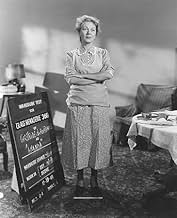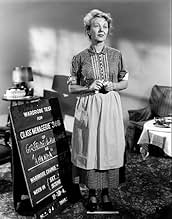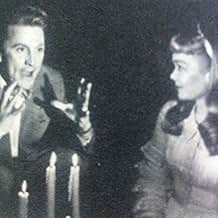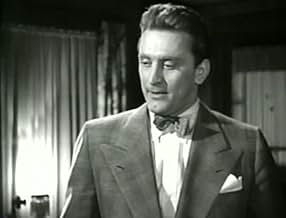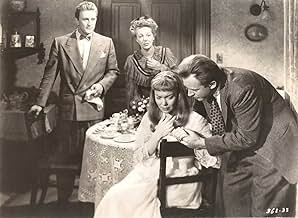AVALIAÇÃO DA IMDb
7,0/10
1,3 mil
SUA AVALIAÇÃO
Adicionar um enredo no seu idiomaMerchant marine officer Tom Wingfield reminisces about his life in St. Louis where he had lived with his nagging mother Amanda and crippled shy sister Laura.Merchant marine officer Tom Wingfield reminisces about his life in St. Louis where he had lived with his nagging mother Amanda and crippled shy sister Laura.Merchant marine officer Tom Wingfield reminisces about his life in St. Louis where he had lived with his nagging mother Amanda and crippled shy sister Laura.
- Direção
- Roteiristas
- Artistas
- Prêmios
- 1 vitória no total
Philip Ahn
- Sailor
- (não creditado)
Chris Alcaide
- Eddie
- (não creditado)
Richard Bartell
- Barman
- (não creditado)
Peter Camlin
- Sailor
- (não creditado)
Perdita Chandler
- Girl in Bar
- (não creditado)
Victor Desny
- Sailor
- (não creditado)
Sarah Edwards
- Mrs. Miller
- (não creditado)
James Horne Jr.
- A Caller
- (não creditado)
Louise Lorimer
- Miss Porter
- (não creditado)
Sean McClory
- Richard
- (não creditado)
Avaliações em destaque
I got spoiled when I watched 1973's The Glass Menagerie; the 1950 version didn't stand a chance when I finally rented it. Katharine Hepburn's class, Sam Waterston's passion, and Joanna Miles's shyness are incomparable. Halfway through the 1950 version with Gertrude Lawrence, Arthur Kennedy, and Jane Wyman, I stopped my curses and comparisons to the taped Broadway performance. I suddenly realized that the earlier version was the original, and since it came first, it deserved fresh eyes and an open mind. With that in mind, I made sure to be less critical during the second half of the movie.
The Glass Menagerie is a Tennessee Williams play, so it's a depressing family drama about a struggling family in the South, in particular, a frustrated young man and his overbearing mother. The patriarch has deserted the family decades ago, and the young man has given up his dreams to work in a factory and take care of his mother and crippled sister.
While in the '70s, Sam Waterston played the character as a young man who sacrificed his youth for his family and doesn't want that pattern to continue for the rest of his life, Arthur Kennedy comes across as an older character, one whose youth has long since passed by. He isn't passionate and desperate to break free; he's resigned to his fate, but still unhappy about it. It's a very different interpretation from the way Sam played the part, but it's equally good. I'm not one to use the phrase "apples and oranges", but in his own way, Arthur does just as good a job as Sam.
The way Katharine Hepburn played her character, audiences can see how charming she used to be in her youthful Southern belle days. She still retains her class and poise in her old age. Gertrude Lawrence is more beaten down and shabby, fitting in with her poor surroundings. Katharine Hepburn is in a league of her own, but Gertrude Lawrence does give a good performance.
I couldn't really come up with a reason for Jane Wyman's interpretation of the sister character. She hardly seemed shy, and she seemed more mentally slow than anything, from her wide-eyed blank stare at her mother, to her sudden fits with no subtle build-up, and the variance of her limp. The one person who was hands-down, no-contest, infinitely better than the Broadway revival was Kirk Douglas, who played the gentleman caller. While he has the smallest part in the show, and he's given so many wonderful performances over the years, I hesitate to say this is one of his best performances, but it's certainly one of his most underrated ones. Usually, Kirk Douglas is either remembered as a bad boy or in a loincloth. In The Glass Menagerie, he plays the absolute antithesis of his usual bad boy roles, and he's fantastic. He aces every facet of his written character. He's supposed to be perfect and wondrous and kind, the image that comes to mind when one thinks of the bygone name "gentleman caller". A gentleman caller is polite, amiable, clean cut, confident, entertaining, and says nothing that couldn't be overheard by your parents. There isn't a hint of rebellion or seduction in Kirk Douglas's performance, and he sets the bar so high no one else can ever hope to play the gentleman caller half as well.
All in all, this version of The Glass Menagerie is pretty good, unless you've seen the 1973 version and believe that's the one and only interpretation. You might want to watch this one first, or just keep an open mind after the remake. Kirk Douglas fans will definitely want to rent this, and if you really like the story, as I do, you might enjoy watching every version you can get your hands on.
The Glass Menagerie is a Tennessee Williams play, so it's a depressing family drama about a struggling family in the South, in particular, a frustrated young man and his overbearing mother. The patriarch has deserted the family decades ago, and the young man has given up his dreams to work in a factory and take care of his mother and crippled sister.
While in the '70s, Sam Waterston played the character as a young man who sacrificed his youth for his family and doesn't want that pattern to continue for the rest of his life, Arthur Kennedy comes across as an older character, one whose youth has long since passed by. He isn't passionate and desperate to break free; he's resigned to his fate, but still unhappy about it. It's a very different interpretation from the way Sam played the part, but it's equally good. I'm not one to use the phrase "apples and oranges", but in his own way, Arthur does just as good a job as Sam.
The way Katharine Hepburn played her character, audiences can see how charming she used to be in her youthful Southern belle days. She still retains her class and poise in her old age. Gertrude Lawrence is more beaten down and shabby, fitting in with her poor surroundings. Katharine Hepburn is in a league of her own, but Gertrude Lawrence does give a good performance.
I couldn't really come up with a reason for Jane Wyman's interpretation of the sister character. She hardly seemed shy, and she seemed more mentally slow than anything, from her wide-eyed blank stare at her mother, to her sudden fits with no subtle build-up, and the variance of her limp. The one person who was hands-down, no-contest, infinitely better than the Broadway revival was Kirk Douglas, who played the gentleman caller. While he has the smallest part in the show, and he's given so many wonderful performances over the years, I hesitate to say this is one of his best performances, but it's certainly one of his most underrated ones. Usually, Kirk Douglas is either remembered as a bad boy or in a loincloth. In The Glass Menagerie, he plays the absolute antithesis of his usual bad boy roles, and he's fantastic. He aces every facet of his written character. He's supposed to be perfect and wondrous and kind, the image that comes to mind when one thinks of the bygone name "gentleman caller". A gentleman caller is polite, amiable, clean cut, confident, entertaining, and says nothing that couldn't be overheard by your parents. There isn't a hint of rebellion or seduction in Kirk Douglas's performance, and he sets the bar so high no one else can ever hope to play the gentleman caller half as well.
All in all, this version of The Glass Menagerie is pretty good, unless you've seen the 1973 version and believe that's the one and only interpretation. You might want to watch this one first, or just keep an open mind after the remake. Kirk Douglas fans will definitely want to rent this, and if you really like the story, as I do, you might enjoy watching every version you can get your hands on.
Gertrude Lawrence only made 13 films in her career, but she was beloved for her stage performances in England and on Broadway. The English-born actress does a fantastic job with her southern accent as Amanda Wingfield. She plays the perfect nagging yet doting mother in "The Glass Menagerie."
Jane Wyman plays her daughter, Laura, and Arthur Kennedy is her son, Tom. The cast of this first film of the play is rounded out with Kirk Douglas as Jim O'Connor and Ralph Sanford as Mendoza. With this superb cast, this may be the best film rendition of the Tennessee Williams story on which the film is based.
One drawback is its revised ending that leaves a question in the viewers mind. So, what eventually happened to Amanda and Laura? And, I agree with observations by some that the effort to make Lawrence appear younger is a negative. Especially when she gets dolled up for the dinner evening with their guest, Jim O'Connor.
Lawrence was well liked by audiences as a dramatic and comedy performer. Besides the stage and films, she played nightclubs and sang. She won a Tony for her starring role in the original Broadway production of "The King and I" opposite Yul Brynner.
But, Lawrence made so few films, that there aren't many examples of her acting talent available otherwise. This version of "The Glass Menagerie" may be the best example for movie buffs to see a performance by this fine British star of stage and screen.
Lawrence died at age 52 of cancer. She lived a high life, well beyond her substantial means, and was deeply in debt most of her life.
Here's a favorite line from the film. Jim O'Connor, Ah, when you first meet Mendoza, you don't like him. But, when you get to know him, you hate him."
Jane Wyman plays her daughter, Laura, and Arthur Kennedy is her son, Tom. The cast of this first film of the play is rounded out with Kirk Douglas as Jim O'Connor and Ralph Sanford as Mendoza. With this superb cast, this may be the best film rendition of the Tennessee Williams story on which the film is based.
One drawback is its revised ending that leaves a question in the viewers mind. So, what eventually happened to Amanda and Laura? And, I agree with observations by some that the effort to make Lawrence appear younger is a negative. Especially when she gets dolled up for the dinner evening with their guest, Jim O'Connor.
Lawrence was well liked by audiences as a dramatic and comedy performer. Besides the stage and films, she played nightclubs and sang. She won a Tony for her starring role in the original Broadway production of "The King and I" opposite Yul Brynner.
But, Lawrence made so few films, that there aren't many examples of her acting talent available otherwise. This version of "The Glass Menagerie" may be the best example for movie buffs to see a performance by this fine British star of stage and screen.
Lawrence died at age 52 of cancer. She lived a high life, well beyond her substantial means, and was deeply in debt most of her life.
Here's a favorite line from the film. Jim O'Connor, Ah, when you first meet Mendoza, you don't like him. But, when you get to know him, you hate him."
Glass Menagerie, The (1950)
*** (out of 4)
Excellent performances make up for a slow pace in this adaptation of the Tennessee Williams play. An aging Southern Belle (Gertrude Lawrence) makes life horrible for her ambitious son (Arthur Kennedy) and crippled daughter (Jane Wyman) because of her dreams of what life should be. She hopes to get her daughter married off, unable to see her faults and she thinks she has a shot when her son bring home a man (Kirk Douglas) he works with. I really wasn't sure what to expect from this film after reading a few negative reviews but I was pleasantly surprised to see that it was worth watching due in large part to the terrific performances by the entire cast. I was really shocked to see how well the entire cast handled the dialogue and how easy it came off for everyone. Lawrence really stands out as the overbearing mother who you just want to hate yet she's so annoying that she becomes charming after a while. I thought Lawrence did a terrific job at playing both sides of the coin because you do hate her for the way she treats her children but when the stranger shows up, she changes to someone completely different. Just check her performance when this stranger tells her something she didn't know. Wyman is also excellent as the shy and cripple daughter. She too got into the role quite well and made us believe everything about the character. Both Kennedy and Douglas also turn in fine performance and most importantly is how well all four act together. I think director Rapper could have pushed the film a little faster as the pace gets very slow after a while but this is just a small complaint. As with many of Williams' stories, this one here had quite a bit cut out to get pass the censors but in the end this is still worth viewing thanks to the cast.
*** (out of 4)
Excellent performances make up for a slow pace in this adaptation of the Tennessee Williams play. An aging Southern Belle (Gertrude Lawrence) makes life horrible for her ambitious son (Arthur Kennedy) and crippled daughter (Jane Wyman) because of her dreams of what life should be. She hopes to get her daughter married off, unable to see her faults and she thinks she has a shot when her son bring home a man (Kirk Douglas) he works with. I really wasn't sure what to expect from this film after reading a few negative reviews but I was pleasantly surprised to see that it was worth watching due in large part to the terrific performances by the entire cast. I was really shocked to see how well the entire cast handled the dialogue and how easy it came off for everyone. Lawrence really stands out as the overbearing mother who you just want to hate yet she's so annoying that she becomes charming after a while. I thought Lawrence did a terrific job at playing both sides of the coin because you do hate her for the way she treats her children but when the stranger shows up, she changes to someone completely different. Just check her performance when this stranger tells her something she didn't know. Wyman is also excellent as the shy and cripple daughter. She too got into the role quite well and made us believe everything about the character. Both Kennedy and Douglas also turn in fine performance and most importantly is how well all four act together. I think director Rapper could have pushed the film a little faster as the pace gets very slow after a while but this is just a small complaint. As with many of Williams' stories, this one here had quite a bit cut out to get pass the censors but in the end this is still worth viewing thanks to the cast.
10peacham
One of the few chances to see the great Gertrude Lawrence on screen. her amanda is so complex,manic,gentele,harsh. a truly great performance that was totally ignored by the academy.arthur kennedy too is compelling as tom. a shame he did not do more William's on screen he was one of the major stage interpreters of the man. only jane wyman seems miscast,a bit too character-actressy for the subtlty of the role to shine through.too bad,because without a good laura half the play is lost. a good effort that could have been great if they had not used wyman.
Gloomy and ponderous are the first words that come to mind when viewing this Warner film directed by Irving Rapper and starring stage star Getrude Lawrence as Amanda Wingfield. While this casting choice gives the film a novel touch, her performance--sometimes strong, sometimes subtle--is not enough to bring the story to vivid life.
Instead, it seems oddly stagebound despite Rapper's attempt to open it up occasionally. JANE WYMAN seems too old to convincingly portray the girl who is crippled socially and physically, as quiet and sensitive as she is. ARTHUR KENNEDY does well with the role of her restless brother (the sort of character he so often played) and KIRK DOUGLAS seems a rather odd choice to play the girl's suitor.
Somehow, none of it really jells.
The viewer is left with the impression that this must have seemed wonderful on the stage (since it was such a well-known hit by Tennessee Williams), but whatever ingredients made it sparkle as a play are sorely missing from the film. In the end, it seems nothing more than an artificial piece and the dialog is never laced with the gossamer effect of poetry that is usually associated with Williams' best works.
The pace is leisurely and never does the story seem vibrant enough to convince us that the events are really happening. Instead, we have an awareness that Jane Wyman is "acting" the role of Laura and Gertrude Lawrence is doing her best to tone down her stage mannerisms and give a natural performance as Amanda.
Summing up: Not the best of Tennessee's work on screen.
Instead, it seems oddly stagebound despite Rapper's attempt to open it up occasionally. JANE WYMAN seems too old to convincingly portray the girl who is crippled socially and physically, as quiet and sensitive as she is. ARTHUR KENNEDY does well with the role of her restless brother (the sort of character he so often played) and KIRK DOUGLAS seems a rather odd choice to play the girl's suitor.
Somehow, none of it really jells.
The viewer is left with the impression that this must have seemed wonderful on the stage (since it was such a well-known hit by Tennessee Williams), but whatever ingredients made it sparkle as a play are sorely missing from the film. In the end, it seems nothing more than an artificial piece and the dialog is never laced with the gossamer effect of poetry that is usually associated with Williams' best works.
The pace is leisurely and never does the story seem vibrant enough to convince us that the events are really happening. Instead, we have an awareness that Jane Wyman is "acting" the role of Laura and Gertrude Lawrence is doing her best to tone down her stage mannerisms and give a natural performance as Amanda.
Summing up: Not the best of Tennessee's work on screen.
Você sabia?
- CuriosidadesIn his 1988 autobiography "The Ragman's Son," Kirk Douglas says that he thinks that the effectiveness of this movie was hampered by Gertrude Lawrence's vanity, since the filmmakers were obliged to add scenes that made her character look younger and more appealing. Douglas also says that he prefers the 1987 film version directed by Paul Newman.
- Citações
Jim O'Connor: Ah, when you first meet Mendoza, you don't like him. But, when you get to know him, you hate him.
Principais escolhas
Faça login para avaliar e ver a lista de recomendações personalizadas
- How long is The Glass Menagerie?Fornecido pela Alexa
Detalhes
- Data de lançamento
- País de origem
- Central de atendimento oficial
- Idioma
- Também conhecido como
- The Glass Menagerie
- Locações de filme
- Empresa de produção
- Consulte mais créditos da empresa na IMDbPro
Bilheteria
- Orçamento
- US$ 1.357.000 (estimativa)
- Tempo de duração1 hora 47 minutos
- Cor
- Proporção
- 1.37 : 1
Contribua para esta página
Sugerir uma alteração ou adicionar conteúdo ausente

Principal brecha
By what name was Algemas de Cristal (1950) officially released in India in English?
Responda
